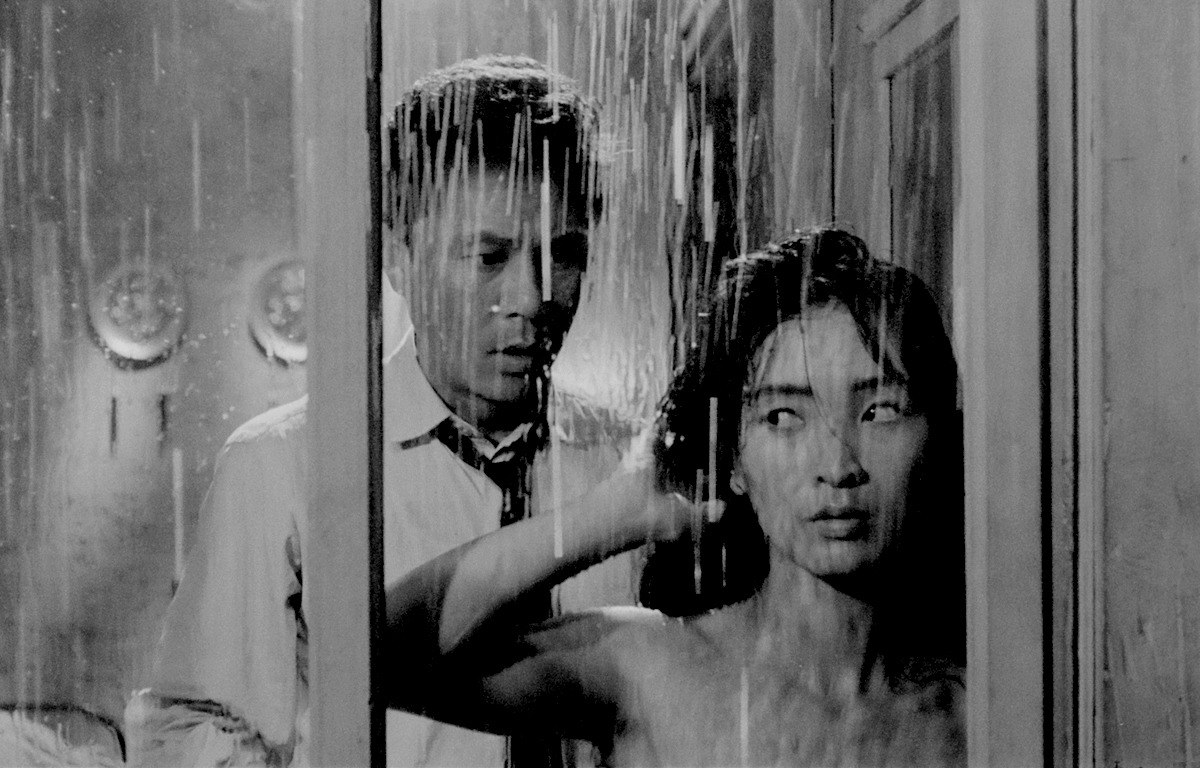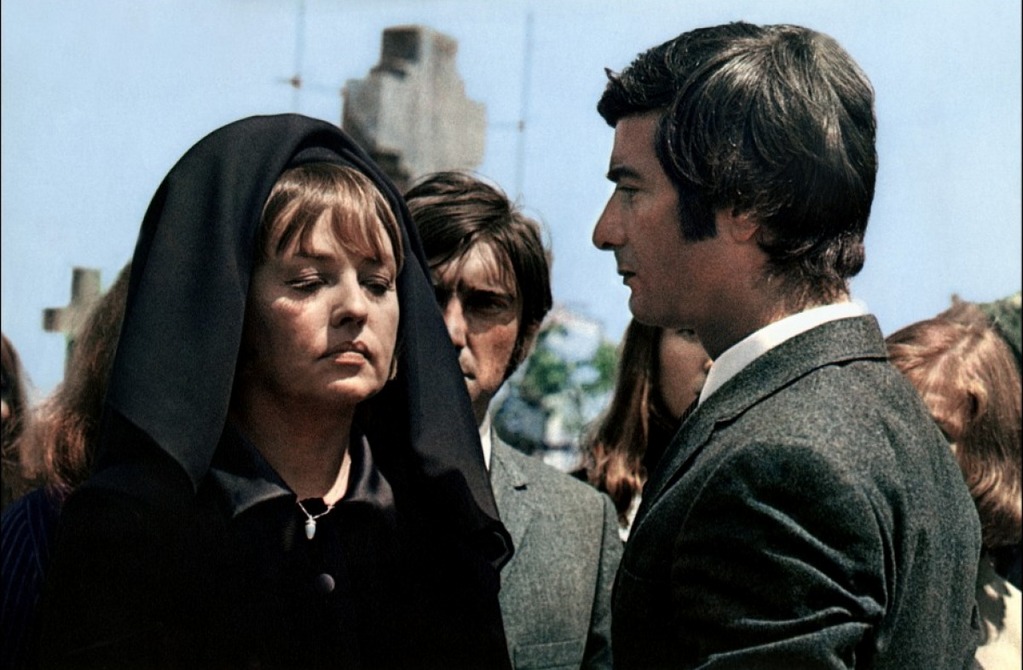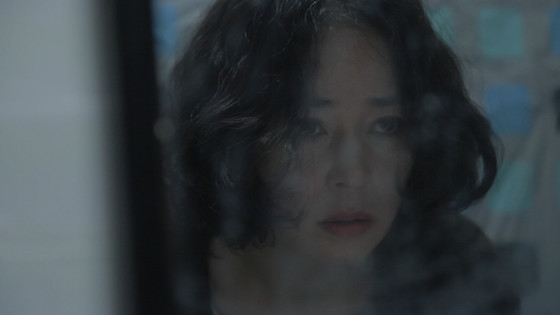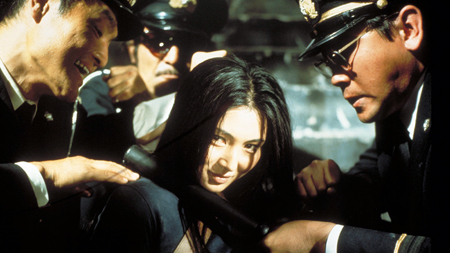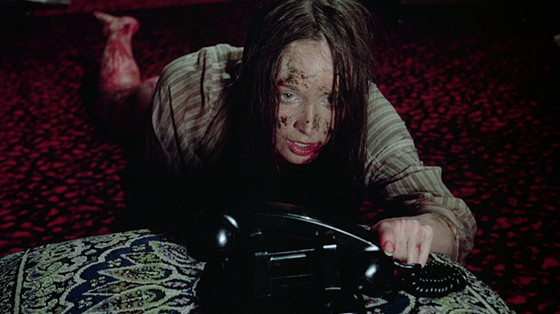14. Death Proof (Quentin Tarantino, 2007)
A stylized B-movie by the hands of Quentin Tarantino. The film is comprised of two parts that are connected through an overarching plot about a fetishistic man who takes pleasure from killing women using his ”death proof” vehicle.
In the first part of the film the old ex-stuntman stalks a group of three girls and follows them to a bar where the ladies have a wild party night. He doesn’t show his true face, manages to pass for a harmless patron of the bar and sets his murderous plans in move.
At the end of the night he ends up killing the girls employing his lethal Honda Civic and gets away with it as the police recognises that their death was the outcome of an accident that they provoked while driving under the influence of large amounts of alcohol. Stuntman Mike is going to be eventually brought to book by another female gang that refuses to share the fate of the previous girls.
In a hilarious sequence these four friends (one of them, ironically enough, a stuntwoman) chase the chaser, get him out of his not so death proof car and beat him to death. Death Proof is inviting, frantic and patently winks at the exploitation cinematic tradition of the 60s and 70s. Above all, its women’s squad is vengeful and knows when it’s time to step on the gas.
13. The Housemaid (Kim Ki-young, 1960)
South Korea nowadays is pretty much acknowledged as the motherland of turbulent and ingenious revenge films. A common misconception is that the Korean obsession with the genre was initiated when Park Chan-wook launched his Vengeance trilogy in 2002, but the truth is that the trope of revenge started been explored by one of Park’s compatriots forty years earlier.
A young and temperamental woman starts working as a housemaid for a middle class family that just moves in its newly bought house. The father is a piano teacher and his pregnant wife decides that she should get emancipated from house keeping when she starts getting exhausted by all of her duties.
The beautiful but wild Mjung-sook intrudes into their lives and seduces the man who eventually impregnates her. After he learns about her unplanned pregnancy, he forces her to have an abortion. As an aftermath to his hasty and unfair reaction the housemaid plagues the lives of every single family member to get revenge on behalf of her unborn child.
The Housemaid is regarded as a cornerstone of South Korean cinema because of its symbolic and artistic value. A claustrophobic but refreshingly innovative film, it encapsulates the fears and agonies of a society in the verge of modernisation and proves that revenge films and Korean cinema go hand in hand.
12. The Girl with the Dragon Tattoo (Niels Arden Oplev, 2009)
Lisbeth Salander aka the girl with the dragon tattoo is deservingly a symbol of cinematic feminism. She is a genius hacker, an untamed free spirit with purposefully unlabelled sexuality and above anything else a true vigilante devoted to fighting men who brutally abuse women. Revenge is her main occupation since she was a little girl. Everything started the day that she decided to set her own father on fire to punish him for his sadistic behaviour towards her mother.
Growing older she only crosses paths with more men who are making the lives of women a living hell and she doesn’t plan to leave them undisciplined. She stays detached from most of the people that surround her, even when it comes to Mikael Blomquist, her close friend and occasional lover with whom she is investigating a series of murders of young girls. It is her duty to be suspicious towards men and has every reason to do so.
In one of the most tempestuous sequences of the film, Lisbeth is raped by her guardian who is blackmailing her in exchange for letting her having access over her allowance. The canny hacker records the hideous act with a hidden camera and uses the video document to turn him into her prey. To make him regret for his actions even more she knocks him down, ties him, rapes him with a dildo and gives him a tattoo that states ”I am a sadist pig and a rapist” stigmatising him for the rest of his life.
11. The Bride Wore Black (François Truffaut, 1968)
Intended as a homage to Alfred Hitchcock, The Bride Wore Black is probably one of the most under-represented revenge movies ever made.
It recounts the story of Julie (Jeanne Moreau), a young woman who at the very start of the film tries to commit a suicide for unknown reasons. Her mother stops her and shortly after Julie announces her decision to go on a trip. This trip is far from recreational as the gloomy woman is determined to kill the five men who assassinated her husband the day of her wedding ceremony, on the steps of the church.
The narrative of the film is splintered in flashbacks and its style is pretty much unruffled in comparison to the disturbed esoteric world of the heroine. Jeanne Moreau perfectly embodies the resolved bride, facing her victims with a mysterious and unwavering stare. The choice of Truffaut to dress the woman only in black, white, and black-and-white clothes adds furthermore to the establishment of the unique stylish aesthetics of the film. No wonder Quentin Tarantino got a little bit jealous of this bride.
10. Pieta (Kim Ki-duk, 2012)
Pieta’s revenge is unlike the others mentioned in this list. Its narrative web is serpentine, dark, subtle and haunting. Kang-do is a young loan collector who terrorizes the lives of poor shop owners, torturing them to get their money, leading some of them even to suicide.
A woman that claims to be his long lost mother appears one day and insists on living with him. The man rapes her and treats her in the worst way possible as a revenge for her absence, showing no real affection or compassion. But this is not the main dish of vengeance that the film has to offer.
The mother seems mostly passive, generous and good hearted. Little by little, she manages to melt the ice cold heart of her son that eventually starts showing signs of unexpected humanity. But she is not who she appears to be and with patience and method waits to strike Kang-do in his time of need and vulnerability.
The roles get inverted and the secret behind the appearance of Mi-son comes to the surface with mortal consequences. The man has to pay for his monstrous practices and the old lady just knows how to make that happen. Pieta is cruel in its profound realism and shows beyond any doubt that a mother in grief is more lethal that any weapon.
9. Female Prisoner 701: Scorpion (Shunya Ito, 1972)
Meiko Kaji again in another Japanese exploitation film filled with sexual perversities, torture and a fair amount of punishment. Nami Matsushima makes the fatal mistake to fall in love with Sugimi who quickly betrays her feelings. Deceived by her corrupt boyfriend, raped and scarred she unsuccessfully attempts to kill him in her exasperation. She is captured and sent to a women’s prison where she will face more pain and humiliation by the sadistic guards and her fellow prisoners.
At the same time Sugimi conspires with Yakuza in order to eliminate her inside the institution and make it look like an accident. His plan fails and after a riot bursts out in the prison, Nami manages to escape in order to hunt down the man she once deeply loved. Dressed in a stylish black outfit, she assumes the persona of the vigilante Lady Sasori (aka Scorpion) and grasping a dagger attacks both Sugimi and the evil Yakuza members.
Scorpion is contemplated as a centrepiece of the exploitation film tradition and numerous contemporary films paid homage to its intelligence and vibrant energy. Among others the film is used as a reference in Quentin Tarantino’s Kill Bill and Shion Sono’s Love Exposure, proof that Lady Sasori’s revenge tale keeps on being inspiring until today.
8. I Spit on Your Grave (Meir Zarchi, 1978)
No doubt this is one of the most disturbing film of the rape and revenge subgenre. Jennifer is an independent and inspired author who moves into a remote house in Kent, Connecticut. Her immense beauty is going to magnetise the eyes of four lowlife men who trail and brutally rape her.
The hideous gang will also tear her manuscript apart, leaving her mortified in a state of profound shock. Jennifer will not remain yielding for too long and she swiftly charges her counter-attack. She takes down the men, one by one, employing her feminine glamour to allure them into torture and death.
The raping scenes of the film are realistic and revolting but thankfully so are those in which the heroine dispatches her persecutors just the way they deserve it. I Spit on Your Grave, also known as Day of the Woman, was banned in plenty of countries because of its graphic violence and it provokes until nowadays mixed responses around the reasoning of its brutality.

